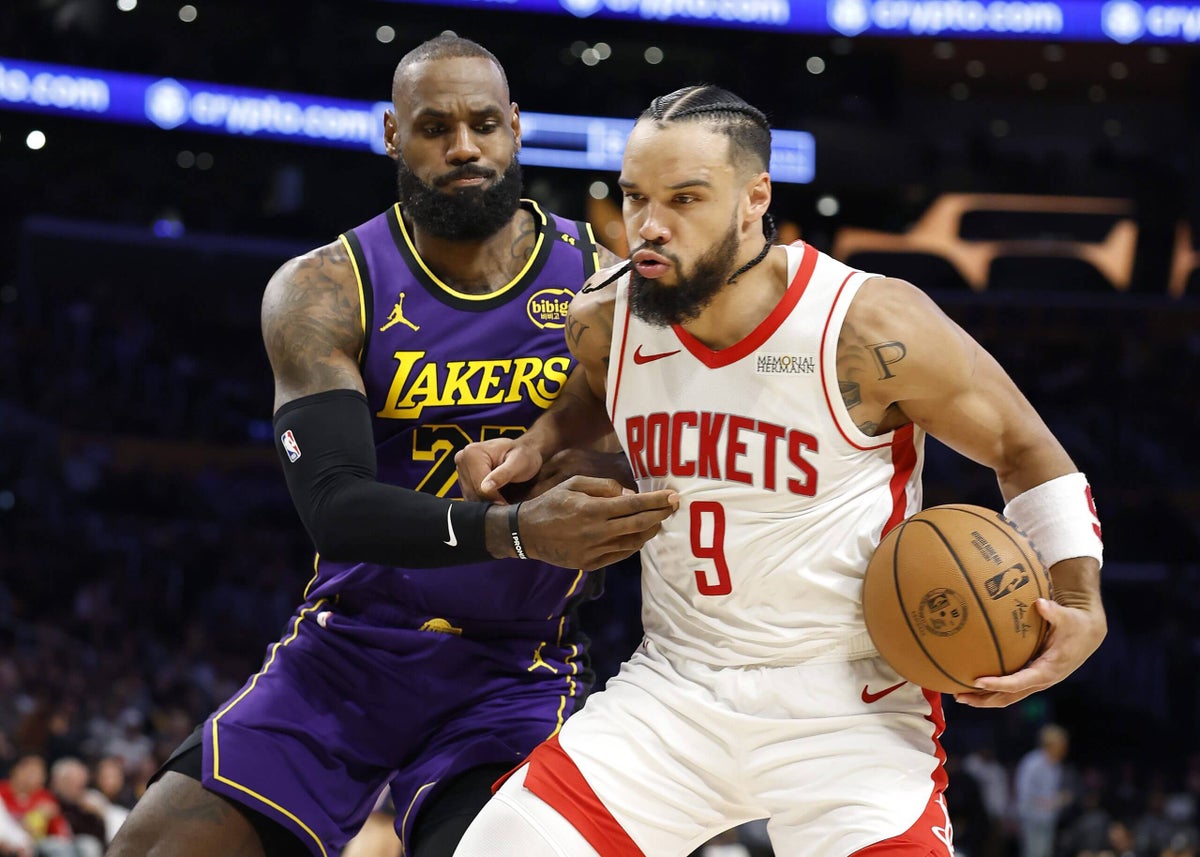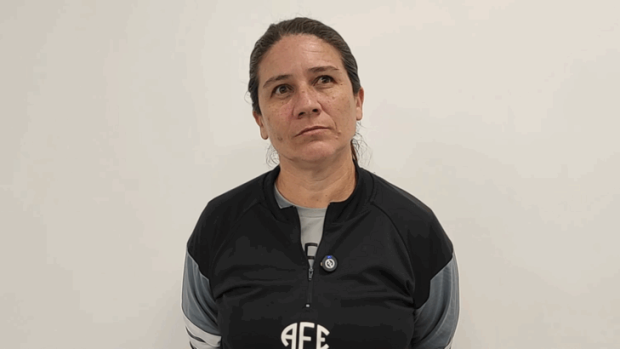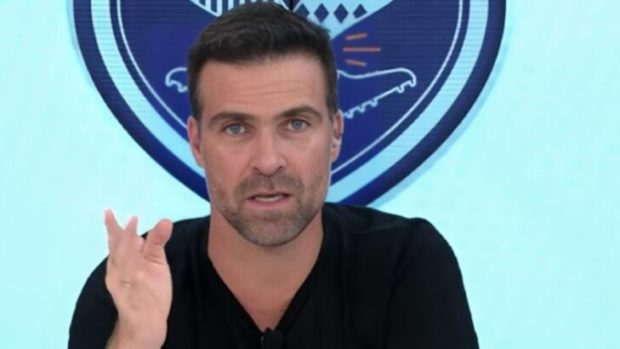

LOS ANGELES — There’s a portion of Dillon Brooks’ pregame routine that has little to do with game action prep and everything to do with the mental aspect of basketball.
Before every warmup, at least six or seven player development coaches and trainers will form a semi-circle around Brooks, who stands directly under the basket. As soon as Brooks touches the ball, the staff members yell, hurl insults and talk trash directly in his ear as he attempts to convert layups and floaters around the rim — mimicking what an opposing crowd would sound like.
Advertisement
The point of the “drill” isn’t to see how many shots Brooks can make in the restricted area. It’s about channeling his focus, blocking out the noise and finding the mental edge necessary to complete a task.
Eight years into his career, Brooks is no stranger to the noise. It’s expected. Welcomed. Cherished. You don’t earn nicknames like “The Villain” by being beloved. And on Monday night, behind enemy lines, Brooks was anything but loved.
Before tipoff, Brooks strolled the sidelines like a hall monitor looking for troublemakers. During player introductions, Brooks was purposely called last, met with a rising crescendo of boos before his full name could even be finished by the announcer. And during the game, Brooks could be seen jawing with LeBron James, Luka Dončić, the Lakers bench — and anyone else in the building that would lend an ear.
But in the final seconds of Monday’s 104-98 Houston Rockets loss, Brooks had the opportunity to cut the deficit to one point. And as the 29-year-old stood at the free-throw line, the outside noise returned, growing louder with each second.
Brooks missed the first free throw. He would go on to make the second, but at that moment, the Rockets were chasing a ghost, forced to play the foul game and hoping the Lakers would slip up. They didn’t. Monday’s game was physical, but Houston’s inability to win the mental game — missing a crunchtime free throw on a night where the team only missed three — cost them.
“All of the reach-in fouls on (Luka) Dončić early, those things add up,” Rockets coach Ime Udoka said. “Some of the pick-and-pops with (Dorian) Finney-Smith when they were small, out of the six, he had three wide-open corner 3s — and (Gabe) Vincent as well, weak-side help for no reason. You’ll live with a few, but the ones that we shouldn’t have given up made the difference in a game like this. So, keeping our focus.”
Advertisement
In a vacuum, the Rockets did enough to win this game. James and Dončić combined for 36 points on 11-of-28 shooting with six turnovers between them. Their defense also held the Lakers to 39.3 percent shooting from the field and controlled the rebounding battle. In any Lakers-centric scouting report, James and Dončić are at the top of the order of operations and all things considered, those three subsections should be enough to get the Rockets over the hump.
But Brooks, who has been to the postseason three times in his career, knows that there’s much more to winning an NBA game. Monday’s loss was as close to a playoff game as the Rockets will experience between now and the end of the regular season. Physicality was the theme of the night, with more bumps and shoves than a wrestling match.
And the Lakers’ length bothered Houston’s backcourt with Fred VanVleet and Jalen Green combining for just 16 points on 6-of-27 shooting. In a game that devolved into a slugfest, the margins would determine the outcome, a lesson Brooks has been taught on numerous occasions. The mental game.
“It’s game planning,” Brooks told The Athletic. “Knowing your personnel and what guys want to do, how fast can we adjust. And, you know, most of the game is mental anyway — no matter if it’s playoffs or a regular game. It’s mental.”
The Rockets (49-27) didn’t concede too much ground in the Western Conference race, still holding a slight lead over the Nuggets and Lakers, which sit 1 1/2 and 2 1/2 games back, respectively. And more importantly, Houston was reminded of Brooks’ defensive versatility and value that will surely come in handy next month.
According to Bball-Index, Brooks ranks in the 100th percentile in overall defensive versatility, 94th in isolation defense, 97th percentile in time spent guarding Tier 1 usage players and 94th percentile in time spent guarding Tier 2 usage players. Brooks is vital to Houston’s defensive setup, which is still third third-most-efficient, per Cleaning the Glass.
Advertisement
The Lakers spent the majority of the game trying to dislodge Brooks from James and Dončić, hunting mismatches elsewhere. Brooks, who is one of the NBA’s premier screen navigators, did an excellent job being an irritant, matching James’ physicality and not falling victim to some of the in-game antics that have plagued him in the past.
And it certainly helps that Brooks isn’t the only defensive stalwart on the perimeter. Second-year wing Amen Thompson is equal parts physical and tenacious and gives Udoka options depending on opposing personnel. Brooks often refers to Thompson as his twin because of their shared defensive responsibilities and slowing down James and Dončić to that degree is commendable, especially with the playoffs on the horizon.
“Take a lot of pride in it,” Brooks said. “And it’s not just me, it’s ‘Twin,’ it’s Tari (Eason), Fred (VanVleet). We’re switching, so everybody is on everybody. We know exactly what guys want to do. Their bench players hit some shots.”
But as mentioned, marginal errors can snowball. As the season has progressed, the Rockets have become more comfortable with playing zone defense, trusting the backline of Steven Adams, Jabari Smith Jr. and Alperen Şengün. If there’s one area of a 2-3 zone that should be accounted for, it’s the corners. But on far too many occasions, breakdowns in communication allowed the Lakers to exploit the Rockets’ scheme.
Mistakes in late March are unavoidable; Vincent and Finney-Smith won’t convert 12 3s as a pair in too many games. But for Houston to attain the goals they’ve set for themselves, mental lapses can’t happen. Mistakes in April don’t come with second chances.
“It’s these games,” Brooks said. “Playoff atmosphere. Watching the film, knowing exactly what they’re going to see in a playoff series. Or even when teams make adjustments, you’re going to see that type of play. Just review it and be ready.”
(Photo of Dillon Brooks and LeBron James: Ronald Martinez / Getty Images)
This news was originally published on this post .











Be the first to leave a comment